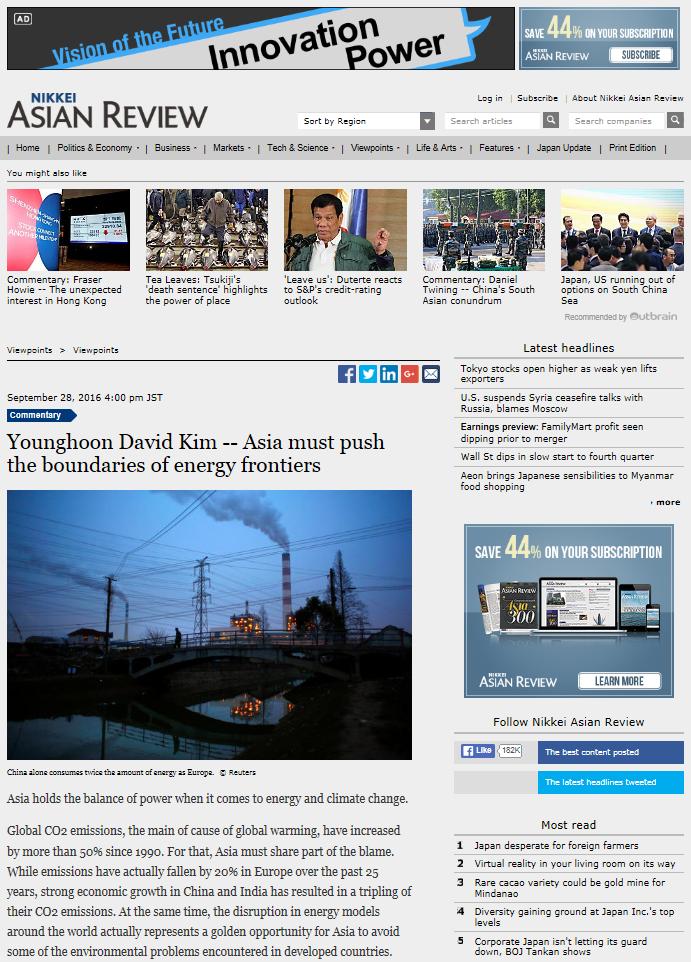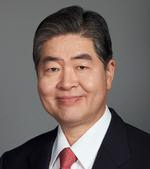- Daesung News
- Read the latest news featuring Daesung Group
| Title | [Nikkei] Younghoon David Kim -- Asia must push the boundaries of energy frontiers | 2016.09.28 |
|---|---|---|
|
FROM: Nikkei Asian Review [Nikkei Asian Review - September. 28, 2016]
Younghoon David Kim - Asia must push the boundaries of energy frontiers
Asia holds the balance of power when it comes to energy and climate change.
Global CO2 emissions, the main of cause of global warming, have increased by more than 50% since 1990. For that, Asia must share part of the blame. While emissions have actually fallen by 20% in Europe over the past 25 years, strong economic growth in China and India has resulted in a tripling of their CO2 emissions. At the same time, the disruption in energy models around the world actually represents a golden opportunity for Asia to avoid some of the environmental problems encountered in developed countries.
China alone consumes twice the amount of energy as Europe and the potential for greater environmental damage from Asia is rising as energy demand continues to grow in the region's efforts to lift populations out of poverty. While per capita CO2 emissions are significantly higher in developed countries at nearly 16 tons annually, they are only 6 tons in China and 2 tons in India.
China and India, which together account for 40% of the world's population, are emerging as the new global energy demand centers and they, along with other Asian countries, must play a more responsible role in global energy governance. In the next generation, there will be one billion more people worldwide and a large share of them will be more urban and affluent. One billion more vehicles will clog the roads. Yet one billion people today, including many in Asia, are being left behind because they have no access to modern energy.
Whether the world can achieve its goal to prevent average global temperatures from rising above 2 degrees Celsius of pre-industrial levels, as agreed at the Paris climate change summit last December, will most certainly depend on what Asia does.
Energy trilemma
Asia is confronting what one could call the World Energy Council calls an "energy trilemma," the need to balance the conflicting goals of energy security, affordable energy and sustainable energy. For example, China and India have large reserves of coal (energy security) which enables them to produce cheap electricity (affordable energy), but the burning of coal significantly increases carbon emissions. Both countries could turn to nuclear power to reduce carbon emissions, but at the cost of making energy less affordable in some cases. Bringing these contrasting trends into harmony is always difficult.
But energy cannot be seen in isolation. It also forms part of a bigger trilemma: the need to balance food, energy and water resources, underscoring what the UN has called the FEW "nexus" to highlight the interdependence of these main building blocks of society. By 2050, global demand for energy will double, while demand for food and water will grow by half. But the United Nations predicts there could be a 40% shortfall in water in the next decade due to severe droughts caused by climate change. That means less water available to produce food and energy.
For governments as well as all relevant sectors of society, decisions on energy supplies must now be related to achieving water and food security. One interesting regional example in this regard is the proposed construction of dams along several major Southeast Asian rivers. Planned dam projects along the Mekong River in Laos and the surrounding area, for example, would appear to solve the energy trilemma for this underdeveloped region. Hydropower appears to tick all the boxes when it comes to energy security, affordability and sustainability. The only problem in this case is that the dams threaten fish stocks and rice yields downstream in Cambodia and Vietnam.
So what can be done in dealing with Asia's energy challenges?
Younghoon David Kim is chairman and chief executive of the South Korean conglomerate Daesung Group and incoming chair of the London-based World Energy Council. |
||
| NO | Title | Date |
|---|---|---|
| 237 | [Petroleum Economist] Planning for ... | 2016.10.21 |
| 236 | [Nikkei] Younghoon David Kim -- Asi... | 2016.09.28 |
| 235 | [Xinhua] Renewable energy needs adv... | 2016.06.24 |
| 234 | [World Energy Council] World Energy... | 2016.06.21 |
| 233 | [World Energy Council] Technology i... | 2016.04.18 |








